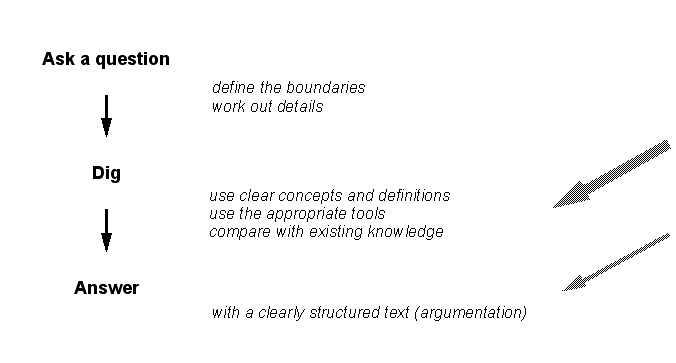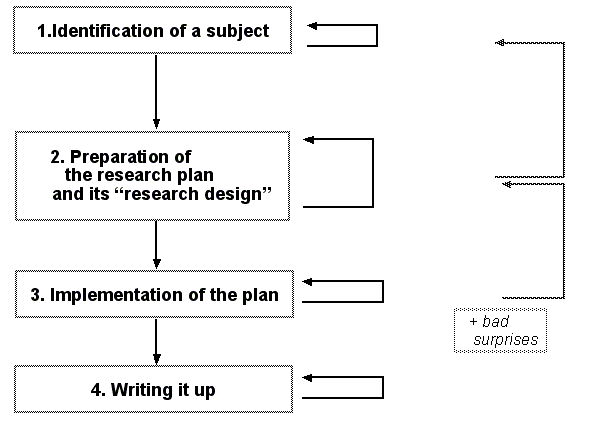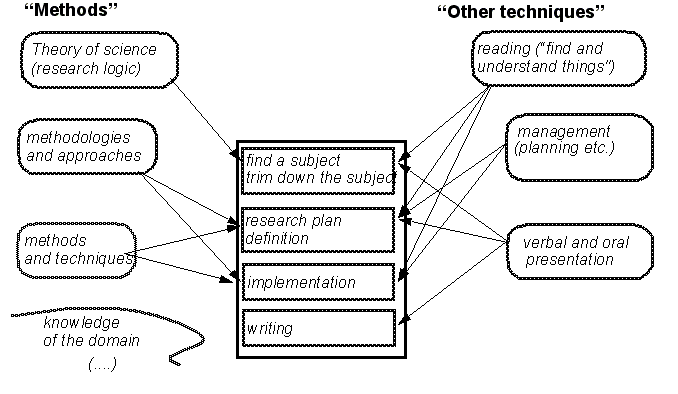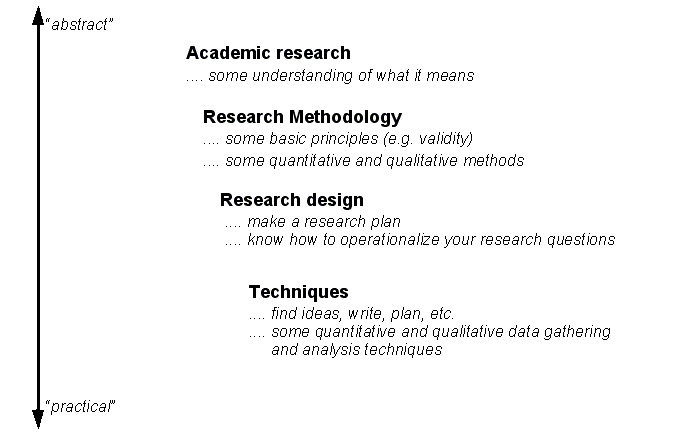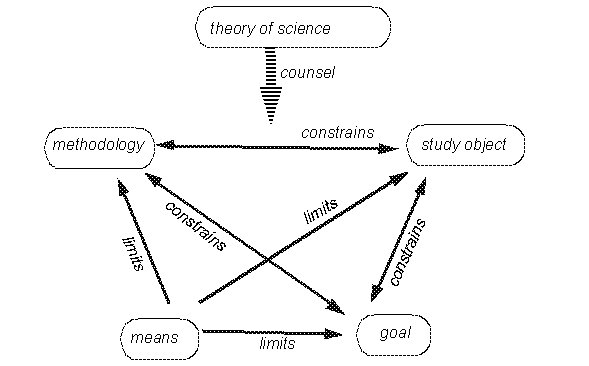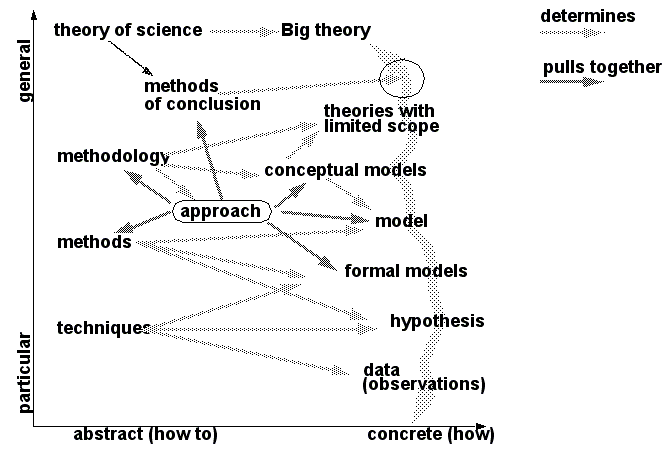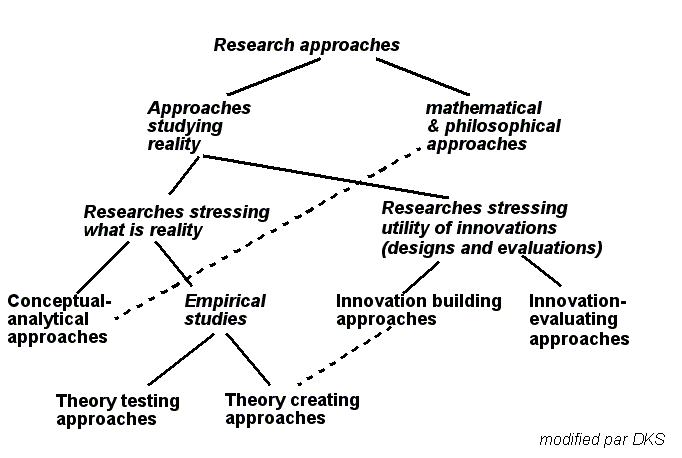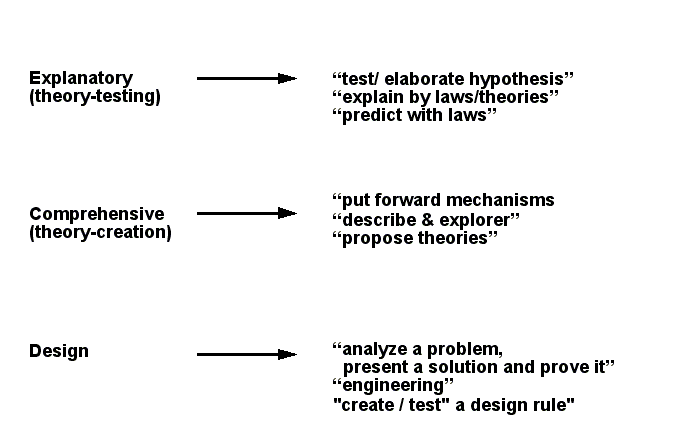Methodology tutorial - introduction
<pageby nominor="false" comments="false"/>
Research Design for Educational Technologies - Introduction
This is part of the methodology tutorial
A first look at research
- Research = ask a question and answer
- Major stages of a research project
- What do you need to know ?
- Objectives of these tutorials
The concept of “science”
Why bother ??
- to understand how to write a research plan
- to understand your academic partners (e.g. your thesis advisors)
- to find out why they don’t like your initial research subject ...
Which elements define a given piece of research ?
- Theory of science:
- what is knowledge ? academic knowledge ?
- how should you reason ? deduce ? induce ? model ?
- The methodology :
- should fit your research subject
- ..... legitimated by some theory of science.
- The research object
- you need to define exactly what you want to study
- The research goals
- what’s the purpose of your study?
- Your means
- time, money,
- knowledge,
- data access
An equilibrium between methods, object, goals and means:
What does this figure tell ?
- In educational technology research, there rarely is a ready solution for your problem !
- There are suggestions (freedom to choose) as well as interdictions (things not to do)
- In other words: You will have to come up with your own research design and its justification !
What do we mean by academic empirical research ( science )?
- A systematic activity
- produced knowledge is a coherent whole
- it (your results) should integrate with a system of knowledge
(build upon
literature and compare with literature)
- centred on reality
- e.g. nature, la society, people’s behavior, people’s attitudes
- in other words: don’t just speculate, look at things
- precise tools (hypothesis, theories, methods, reliable techniques etc.)
- be aware of your "confirmation biais", test your conclusions against alternative
explanations,
- generalization
- contribute to theories by using (and testing) their theoretical statements
- reuse (and criticize) their instruments (frameworks, analysis grids, etc.)
- suggest modifications (or even new theories)
in addition:
- a belief in determinism,
- phenomenons are the necessary consequence of conditions (causes).
- In other words: randomness in explanation is only due to ignorance, complexity, etc.
- relativism :
- our knowledge is not perfect ,
- .... in particular in social sciences where man is subject and object, observer and
observed and where many variables influence a phenomenon
What’s an interesting piece of research ?
![]() You will have to produce something that is (somewhat)
new
You will have to produce something that is (somewhat)
new
- answer new questions
- answer old questions without good answers
- answer otherwise to questions addressed by the literature
- provide support to answers found in literature with a new argumentation
- apply a theory to a new types of cases (e.g. does it apply to Mauritius school
system ?)
![]() It produces something that provides “satisfaction”
It produces something that provides “satisfaction”
- to a certain community
(you don’t write your thesis for yourself !). - to you !
The role of method and theory
Epistemological dimensions of research
File:Book-research-design-10.png Theories of science
- Sets from a philosophical perspective the conditions of scientific knowledge
- example: "you can’t prove a hypothesis" (only evidence, show that alternatives are
wrong,...)
File:Book-research-design-11.png Methodologies (also called approaches)
- general recommendations on how you should design a research plan .
- draws from a theory of science and suggests a set of legitimate methods.
- example "you should draw hypothesis from theory and then test it with quantitative
research"
File:Book-research-design-12.png Methods
- general recipes to study a given class of phenomenons
- examples: "survey research methodology", "participatory software design"
File:Book-research-design-13.png Reasoning Methods
- how to pass from data to theory and from theory to data ?
- .... (influenced by theories of science and doctrine of approaches)
File:Book-research-design-14.png Techniques
- practical tools to gather, manipulate, analyze data, manipulate concepts, etc.
The range of theories
File:Book-research-design-15.png “ big theories ”
- go after complex topics (can’t fully be tested)
- .... evolution of children’s minds, learning, society, .....
File:Book-research-design-16.png Theories with limited scope
- concern more restricted domains
- examples: usability guidelines for software, conditions under which multimedia
animations are effective, conditions under which e-learning projects can be sustainably implemented, ...
File:Book-research-design-17.png Formal models
- based on formal systems, e.g. mathematics, logics, rule systems, formal learning
designs
- sometimes tested with empirical data (not always, e.g. micro-economics is not).
File:Book-research-design-18.png Conceptual models
- e.g. “systems analysis”, activity theory
- .... conceptual tools that allow you to talk about a phenomenon, to look at them in a
certain way
File:Book-research-design-19.png Hypothesis
- Are frequently part of a theory or a formal model
- Clear propositions that can be tested
- e.g. "to introduce technology in schools, you need to provide a pedagogical support
structure"
Everything together: components of knowledge
:.
The paradigm concept
- Origin: Kuhn and his studies on “normal science”
Major components of a paradigm:
- a general and “asymptotic” research goal
- ex: “understand how to teach (instructional design)”.
- At this level you will find general ideas at what you should look at.
- Intermediate level: partial theories .
- Par ex: to teach sustainable knowledge, one must engage students in practise and
gradually introduce authentic problems that must be solved by themselves
- Operational level: Empirically tested theories .
- Par ex: how to teach procedural programming, drive a car, solve a simple geometry
problem.
- Each paradigm favors certain methodologies and provides you with "toolkits"
Why follow a paradigm ?
File:Book-research-design-21.png your are much more productive if you can count on confirmed research methodology
File:Book-research-design-22.png different researchers can work together , or at least profit from each other’s results
what happens if you don’t ??
File:Book-research-design-23.png people will not understand you andt herefore ignore you if you don’t use accepted methodology or problems
File:Book-research-design-24.png your results are not comparable
The approach
File:Book-research-design-25.png There are in fact 2 different definitions
File:Book-research-design-26.png “approach” +/- = general “methodology”
- a “ way to do it ”
- includes a set of useful and tested methods for studying a set of phenomena
e.g. the you could use the quasi-experimental design to study school reforms
- an approach is often transdisciplinary:
example: the quasi-experimental
approach was developed in educational science but has been exported to public policy analysis and many other domains
File:Book-research-design-27.png “ approach” = “paradigm ” .
- for example: “activity theory approach” to say
- you believe in a marxist activity-based scheme of looking at social phenomena
- you may adopt Engeström’s related educational theories
- you favor qualitative methodology
- you are interested in change
A word on interdisciplinarity
- combinations of approaches or paradigms
3 variants:
File:Book-research-design-28.png multi-disciplinary :
- juxtaposition on the same object of various research paradigms, each one keeping its
own language
File:Book-research-design-29.png Interdisciplinarity :
- confrontation and exchange of methods and/or adoption of a mix from various fields for
a new field
File:Book-research-design-30.png Trans-disciplinary :
- usually a high abstraction level, e.g. systems theory
Difficulties
File:Book-research-design-31.png multi-disciplinary research is difficult to coordinate.
- needs wide knowledge and very good communication skills to talk to people using another
“languages”
File:Book-research-design-32.png Interdisciplinary research is easier
- ..... because only methods and concepts that fit are taken from other fields,
- however, concerned scientific communities may hate you for that
- takes more time than disciplinary research (e.g. doing a "complete" educational
technology thesis that involves pedagogy, psychology, sociology and ICT development takes more than doing a thesis in just one of these areas).
Types of research
Classification according to theory level
- Simple description:
- forget it, it doesn’t have much academic value
(unless it is led to prepare
- forget it, it doesn’t have much academic value
further research)
- Classifications and categorizations : put order in concepts or data:
- The intelligent case study (exploratory research)
- Typologies (identify characteristics of classes of cases, e.g. uses of technology in
schools, types of teachers according to their beliefs in pedagogy, use of ICT, use of new pedagogies, etc.)
- Ideal-types (theory-based identification of classes of cases)
- The systems model (shows interactions between elements)
- ....
- Research where theory plays important role:
- Theory attempts generalization and demonstrates regularities .
- Theory tries to understand or to explain or to predict .
Scientific ends (modified from Marshall & Rossmann 95: 41)
|
Finalities |
Typical questions |
Approaches |
Methods |
|---|---|---|---|
|
exploratory
|
What happens in this program ?How does this organization work ? |
|
|
|
explanatory
|
Which events, behaviors, beliefs result in this phenomenon ? |
|
|
|
descriptive/comprehen.
|
What are the events, structures, processes that constitute this phenomenon ? |
|
|
|
predictive
|
What’s the result of X?How does X influence Y ? |
|
|
|
engineering
|
What’s the problem ?How to build something ?Does it work ?What are its effects ? |
|
|
Typology inspired by Järvinen (2004: 10)
A simple typology at the end
- you may combine ...
